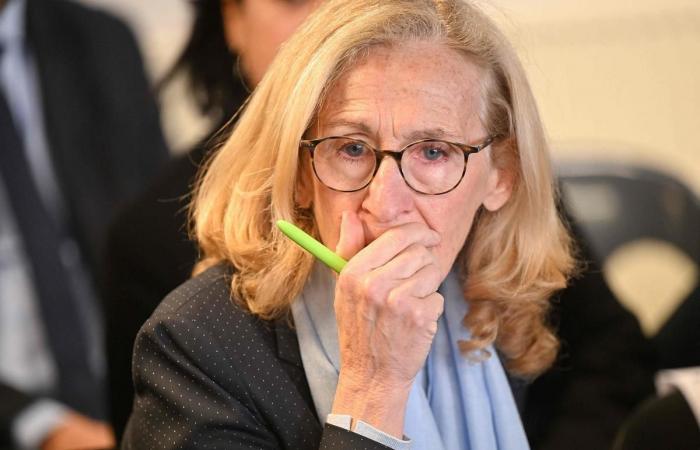CIt could almost be funny. As long as you are not a parent, a student or a teacher. To be listed in the annals of chaotic back-to-schools, the year 2024-2025 had a real challenge to overcome, as the teachers’ unions noted with some humor. “In September 2022 and 2023, we had a new Minister of National Education, Pap Ndiaye then Gabriel Attal. Last year, we even had four in one year,” replied Franck Hialé, regional academic secretary for Unsa Education, to “Sud Ouest”. “The year was mainly marked by untimely statements and unsuitable reforms,” added his colleague, Guislaine David, general secretary of FSU-SNiupp, the leading union in primary education, at a press conference.
On the contrary, on the eve of this return to school – this Monday, September 2 – no more Minister of National Education except for a resigning minister, Nicole Belloubet, supposed to ensure “current affairs”… and the official back-to-school conference for the press this Tuesday, August 27! When on the substance, the silence is deafening on the implementation of reforms, while France is hanging on the announcement of a new government…
“This school year, marked by a major change, the reform of middle schools, strong, philosophical societal choices, was very political,” insists Franck Hialé. “And finally, there is a total absence of politics! No more sound, no more image,” he says, expressing a “feeling of abandonment.” “Totally absurd,” “surreal,” “unprecedented,” continue the two union leaders, “running out of adjectives as the situation is each year more absurd than the last and raises new questions,” continues the FSU.
Risk of a big gap?
“In 2023, it was a question of knowing whether there would be a teacher in each class; this year it is a question of knowing whether there will be a minister and whether he will stay until the end of the year,” Guislaine David says ironically. With a new government, “should we, teachers, commit fully to these reforms, or should we tiptoe through them because they will be abandoned?” asks Franck Hialé. Finally, if the Aquitaine union representative welcomes the massive recruitment of contract teachers in middle schools to meet the needs of the level groups, will they be dismissed in the event of a less “right-wing” minister?
While waiting for the situation to become clearer – and to stabilise – between the Élysée, Matignon and the rue de Grenelle, teachers have set to work. With, as tools at their disposal, nothing more than the back-to-school circular published this summer, drafted by the General Directorate of School Education (in the meantime, on 16 July, a new director was appointed).
College reform
However, the challenge of this school year goes far beyond the framework of “current affairs”. Starting with the reform of the middle school, recalled in the back-to-school circular. “Except that the text is very vague, we have to make do”, regrets the Unsa union member, concerned first and foremost since he is a mathematics teacher in Béarn. “The establishment of needs groups in mathematics and French in 6e et 5e is indeed very complex,” the teacher supports. The “technical” part has been delegated to the heads of establishments, with “real autonomy on the subject. As a result, there will be very different realities – and therefore inequalities – depending on the colleges, either because the teaching teams have made choices, or according to logistical constraints, such as the number of classes, classrooms and teachers.” “We will also have to provide after-sales service for the level groups, with the students and the parents,” fears Franck Hialé. And the impact on the mental health of the students…
Missing measures
“Strengthening fundamental knowledge”: since the last Pisa survey on student achievement, this has been the government’s mantra. The back-to-school circular takes up the argument and the figures and recalls that three “substantial developments” are expected from this back-to-school period, with a new way of teaching in primary schools.
In mathematics, a new didactic approach around the triptych: “manipulate, verbalize, abstract”. In French, “the practice of reading and writing, daily, sustained and systematic”, says the text. “Except that it is already the case”, wonders Guislaine David, from the FSU. In return, she lists the “disappeared” measures. Examples? “Dictation, the abolition of fill-in-the-blank texts or mathematics according to the Singapore method, we don’t hear about them anymore.”
Or even “the exclusion of disruptive students and the return of authority to school”. And the pre-back-to-school on August 20 for students in difficulty. And what about empathy and emotional and sexual education classes? The two unions haven’t heard anything about it for a long time. “Empathy is the whole issue of nursery school”, opposes the FSU secretary. “From there to making it a separate subject…” The labeling of school textbooks, although officially included on the agenda for the 2024 school year, would be postponed, according to the unions. Just like the reform of teacher training.
On the other hand, national assessments have not been forgotten. They will be held in the first weeks of the school year, each year in elementary school. And will make it possible to compose the “need” groups. “Not only do these generate stress for students and teachers, but they are also standardized and do not correspond to the needs of students,” supports the FSU, which calls for boycotting them.
Strike on September 10
In return, the FSU issued counter-proposals: “reducing the number of students per class in nursery and elementary schools; abandoning the teachers’ pact, the clash of knowledge and national assessments”. In this sense and at the call of the FSU-Snuipp, the CGT Éducation, and Sud Éducation, a strike is announced for September 10 in nursery and elementary schools.







